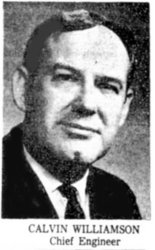Ham Radio
W4RFM
In ham radio circles often the term: Elmer" is mentioned. As I understand it, an Elmer, is one who teaches a newcomer. Well, in addition to the small amount gleaned from the "Handbook "I learned from a former U S Navy sparks, Mr. Calvin C. Williamson. Cal's picture is at the bottom of the page. A gentle, soft talking and extremely smart individual. Cal was the engineer for a local station, and operated a radio/T V repair shop. When Cal was on duty as the "First Phone" watching a directional A M station at night, I would drive out to the transmitter, bring along a couple of Bar B Q's and Cokes, and he would teach me. From 63 to 1966 I learned a lot of electronic magic from Cal.
He had a really dry sense of humor. A case in pont; one day he was looking at my Federal console manual and came upon the power supply schematic. He added a footnote to the drawing: (arrows pointing to the plates of the 5U4 rectifier)
"If there is some question as to the power supply working properly, with A C applied, simply moisten the tips of two fingers and place simultaneously at points here and here. While this is not an accurate measurement of direct current, it will indeed indicate that potential exists".
I was fortunate to talk to him in 1992 before he passed away, and thank him for taking
the time and having the patience to show me, teach me, and be my friend.
HIGHER EDUCATION
After high school, I enrolled at the Alabama School of Trades; it was there in the fall of 1964 I began learning under "formal" circumstances. Richard Starkey (not Ringo) and J.B. Weston knew it, and taught it. I enjoyed those days, because each day was all about learning what I wanted to learn - radio. There were classes in math, (I learned to use a K&E slide rule - it was the 60's,) and English also, but the broad part of the day was electronics theory and hands on in the shop.
That darn CODE
With all due respect to Samuel F.B. Morse, I hate Morse code. Probably because I had one foot in the broadcast side, and one foot (or a few toes) in the ham side, I never became a fan of the code. I learned enough to pass the tests, but I have never been a brass pounder. I have the highest respect for those that do code, because I know what a challenge it is to learn and use, but I don't want to be one. I am reminded of some that are, Robert "Cactus" Gay (K4YMB) - another mentor of mine, can carry on a conversation with you, and de-code dits and dahs at a blurry speed with no sweat. The late Harold Hughes (W4ZS) or "Cuz" as everyone called him, could do 40 wpm I know....When I started building ham gear in the 1970's, Harold would make sure I didn't blow up, melt down, or in other ways destroy the pieces - parts I was working with, thanks Cuz.
You never quit learning.
These days when something R.F. or audio has me stumped, I know several folks who usually have the answer, or point me in the right direction: Watt Hairston (K4WRF), Vic Jester, Dave Hultsman, Jim Gilmore, Lane Lindstrom, and Ron Wilson (K4POZ) are among many who remember much more than I do, and have been there and done that. I appreciate having someone I can go to when necessary. Thanks guys.
